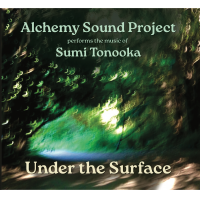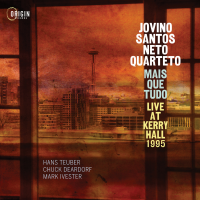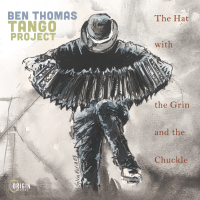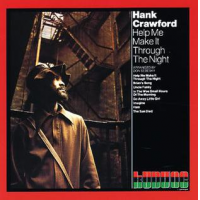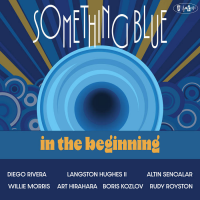Home » Jazz Articles » Liner Notes » Marion Brown: Three For Shepp To Gesprachsfetzen Revisited
Marion Brown: Three For Shepp To Gesprachsfetzen Revisited
Just why

Marion Brown
saxophone, alto1931 - 2010

Dave Burrell
pianob.1940

John Coltrane
saxophone1926 - 1967
Most importantly, though he was adept at free improvisation, Brown was also at home with consonance, structured composition and modal and melodic forms of improvisation. Even at his most abrasively intense, he was never more "difficult" than, say, his brothers in arms

Albert Ayler
saxophone, tenor1936 - 1970

Cecil Taylor
piano1929 - 2018
The reason for Brown's neglect is perhaps because in a complicated world people crave simplicity, demarcations and straight lines. While there is nothing forbiddingly complex about Brown's legacy, its rainbow nature resists the easy categorisation so beloved of critics. Brown saw no contradiction between feeding the fires on Ascension and taking the starring role on his friend " data-original-title="" title="">Harold Budd's glacially serene song-cycle The Pavilion Of Dreams (Editions EG, 1978).
Brown's own work, too, was unfettered and diverse. On albums such as Three For Shepp (Impulse!, 1967), for instance, he mixed bravura free improvisation with elegant balladry; on the triptych Afternoon Of A Georgia Faun (ECM, 1970) / Geechee Recollections (Impulse!, 1973) / Sweet Earth Flying (Impulse!, 1974) he explored west African and southern US folk forms to create an ethnomusicological autobiography the like of which we would not hear again until

Matana Roberts
saxophone, alto
Gunter Hampel
woodwindsb.1937
More than this, unlike his contemporary

Pharoah Sanders
saxophone, tenor1940 - 2022
Brown was already defying categorisation in 1966 when he recorded Three For Shepp, whose six tracks open Three For Shepp To Gesp?chsfetzen Revisited. Brown's opening "New Blues" and Shepp's closing "Delicado," though compelling, are relatively orthodox expressions of mid 1960s New Thing. The four tracks they bookend, however, are distinctive even today in 2024. Brown's exquisite "Fortunato," though it sounds like nothing Pharoah Sanders ever wrote, inhabits similarly pretty terrain as Sanders' 1967 Impulse! astral-jazz manifesto, Tauhid's, "Upper Egypt & Lower Egypt" and "Japan." Of the Shepp tunes, "West India," with its Caribbean flourishes and calypsonian alto solo, is a first taste of what would become an ongoing strand in Brown's music.
Multi-instrumentalist Gunter Hampel—billed as co-leader with Brown on the 1968 edition of Gesp?chsfetzen (Calig)—is another wayward one-off who deserves to be listened to more often. His 1965 album Heartplants (SABA) was among the earliest fully realised recordings of European free jazz, and in 1966 he was among the first European musicians to notch up a release on ESP-Disk. In 1968, in Paris, he played on Brown's Le Temps Fou (Polydor). The same month, in Munich, the pair recorded Gesp?chsfetzen (which translates as "a scrap of conversation"). Brown's abandoned solo on the title track and proto-skronk romp on "Exhibit A" are among the highlights and Hampel's textural inventions, on vibraphone and bass clarinet, are a joy throughout.
Brown and Hampel titled what would be their final album, Gemini (Birth) because by 1993 they regarded themselves as twins, despite the ethno-cultural differences which could have divided them. Explained Hampel in a recent interview: "Jazz exists in this world so that things become clear."
Liner Notes copyright ? 2025 Chris May.
Three For Shepp To Gesprachsfetzen Revisited can be purchased here.
Contact Chris May at All About Jazz.
Chris May is a senior editor of All About Jazz. He was previously the editor of the pioneering magazine Black Music & Jazz Review, and more recently editor of the style / culture / history magazine Jocks & Nerds.
Track Listing
New Blue; Fortunato; The Shadow Knows; Spooks; West India; Delicado; Gesprachsfetzen; Exhibit A; Babudah; Tomorrow Is the Beginning of the End of Yesterday; Aba.
Personnel
Marion Brown
saxophone, altoGrachan Moncur III
tromboneDave Burrell
pianoStanley Cowell
pianoBeaver Harris
drumsGunter Hampel
woodwindsNorris Jones
bass, acousticBobby Kapp
drumsAmbrose Jackson
trumpetBuschi Niedergall
bass, acousticSteve McCall
drumsBurton Greene
pianoAdditional Instrumentation
Gunter Hampel: vibraphone and bass clarinet.
Album information
Title: Three For Shepp To Gesprachsfetzen Revisited | Year Released: 2024 | Record Label: Ezz-thetics
Tags
Comments
PREVIOUS / NEXT
Support All About Jazz
 All About Jazz has been a pillar of jazz since 1995, championing it as an art form and, more importantly, supporting the musicians who make it. Our enduring commitment has made "AAJ" one of the most culturally important websites of its kind, read by hundreds of thousands of fans, musicians and industry figures every month.
All About Jazz has been a pillar of jazz since 1995, championing it as an art form and, more importantly, supporting the musicians who make it. Our enduring commitment has made "AAJ" one of the most culturally important websites of its kind, read by hundreds of thousands of fans, musicians and industry figures every month.











 Buy Now
Buy Now



